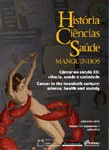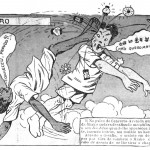Luiz Antonio da Silva Teixeira
Fundação Oswaldo Cruz Rio de Janeiro
Under the auspices of the Casa de Oswaldo Cruz/ Fiocruz and with the support of the Faperj and CNPq research funding agencies, the project Cancer Control in Brazil analyzes the history of anticancer public policies and medical initiatives in Brazil. One of the products of this endeavor is Luiz Antonio Teixeiras article Cancer control in Brazil in the first half of the twentieth century, published in a special História, Ciências, Saúde Manguinhos supplement dedicated to the topic.
Throughout the first half of the twentieth century, cancer was seen as a secondary problem in Brazil, outranked by the high rates of infectious diseases afflicting its population, especially the poorest. It was only in the 1920s, after Europe and the United States started showing greater concern about the disease, that Brazil took its first actions against cancer. The creation of specialized hospitals in major cities of Southeast Brazil, the implementation of sanitary education campaigns highlighting the need for early detection, and the 1941 establishment of a national cancer service were vital components in the process of putting cancer on the public health agenda in Brazil.
The earliest medical studies of cancer in Brazil were the fruit of contacts between Brazilian physicians and their European and American colleagues, who presented papers on the topic at international medical congresses. When Brazil stepped up the overall pace of its public health activities in the 1920s, the country took its first anticancer initiatives, motivated by the concern that the disease might be contagious. During the next decade, marked by the personalistic character of the Getúlio Vargas administration and by closer scientific ties between Brazil and Germany, medical efforts to control cancer were advanced by a number of Brazilian surgeons interested in the disease. The key figure in this regard was Mario Kroeff, whose entrepreneurial skill and personal ties to the inner circles of government played a vital role in the founding of new cancer institutes and broadening of public policies intended to control the disease. Unique to the Brazilian experience was the immense popularity of electrosurgery among leading cancer surgeons of the day. Imported from Germany, the technique had been discredited in most European countries, yet electrosurgery helped Kroeff earn the social recognition needed for him to push forward use of this technology.
Teixeiras article shows how cancer control efforts in Brazil gained ground slowly, despite the first successes achieved by Kroeff and other cancerology pioneers. It was only when cancerology began acquiring institutionalized form as a specialty in the late 1940s, thanks to the work of certain scientific and professional institutions, that cancer control initiatives became more substantial and earned a permanent place on Brazils public health agenda.









